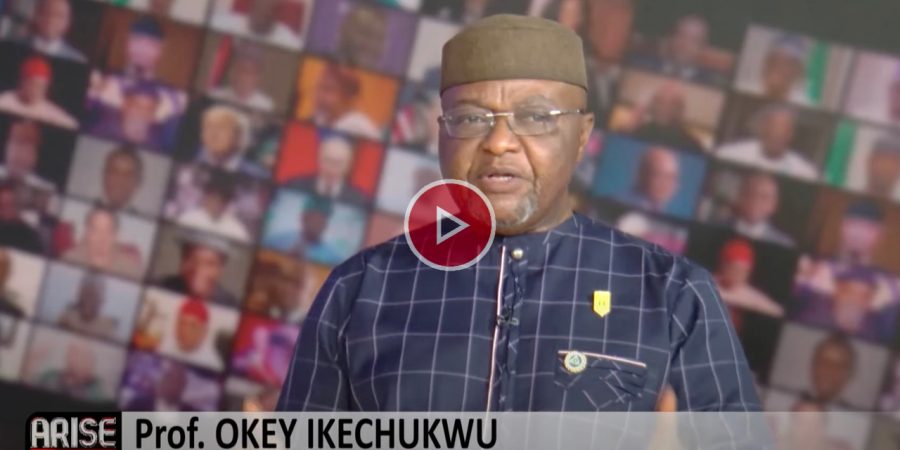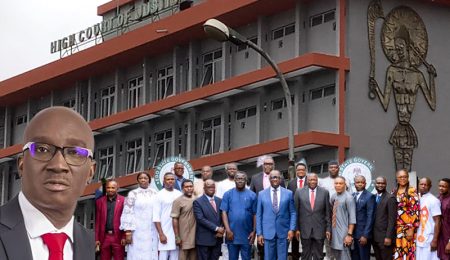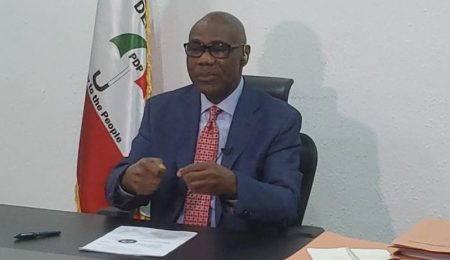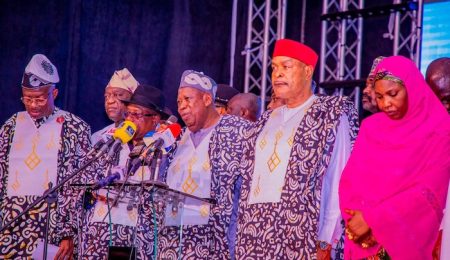A Strategic Management and Human Capital Development expert, Prof. Okey Ikechukwu has criticised recent comments by the Secretary to the Government of the Federation, George Akume, on Nigeria’s leadership rotation.
Prof. Ikechukwu, in an interview with ARISE NEWS, described the statement as a distraction and emphasised the need for political realism over debates on fairness or regional entitlement to the presidency.
He also addressed historical patterns of leadership in Nigeria and the practical challenges of altering the current political structure.
Addressing the essence of the principle of rotation and whether it should be traced back to 1999 or 1960, he critiqued recent remarks by Secretary to the Government of the Federation, George Akume.
“The statement by the Secretary to the Government of the Federation, George Akume, was totally unnecessary,” Ikechukwu remarked.
“It created a distraction, it’s directing fights that are phantom fights, and to that extent, I’m not sure that he has even served his party well. But again, somebody is free to comment.”
Delving into leadership tenure, he stated, “If you want to speak of the leadership of Nigeria, the highest position is that of the president or head of state.
“If that’s a criterion he wants to use to measure which region has held the larger part of that position, be ready to admit that the north has been in power for a much longer period.”
On the principle of rotation, Ikechukwu suggested looking at the last 24 years since 1999, arguing that political platforms like the PDP and APC are less about ideology and more about personal ambition. “For me, there is no such thing as the PDP or APC. If you look at the personnel, the former governor of Nasarawa was a chairman of APC before he got thrown out in a very disturbing circumstance.
“How many people in the strongest position in APC are not in PDP? Even Atiku himself,” he said.
“Let’s not pretend; this is about individuals who want the presidency, who need a platform for it, and who feel that if you are on this platform and it’s not working, you go to another.
Now he [Atiku] is on a platform that he suspects will not be viable for 2027, so he is crying out in the name of the north.”
On the historical perspective, Ikechukwu explained that since 1999, the south has held the presidency for 17 years. “Obasanjo was around for eight years; Yar’Adua came on to stay for eight years.
“The constitution provides that when, in some circumstances, the president is unable to carry out his function, the vice president takes over. But this is a country where anything can be configured despite what the constitution provides.”
Touching on past political transitions, he added, “The north didn’t like the fact that Yar’Adua passed; they didn’t like the fact that Goodluck Jonathan was going to take over. The doctrine of necessity came up after long negotiations.
“Let us not forget that it was the north that allowed him to contest. Why everybody became angry is that he did not fulfil all the elements, and at the risk of sounding mischievous, this instance should be put on the table: Jonathan would not have continued if there was opposition from the north.”
Looking ahead, Ikechukwu underscored the importance of political realism in addressing current issues. “For me, it’s a question of political realism. Is it possible to dislodge the incumbent president? Would it make sense to say that yes, he has been around, and for other presidents that have had eight years in principle—bearing Yar’Adua’s case—that he should also have eight years in principle?”
He argued that efforts to challenge the incumbent might be futile. “My take is that the aspirations to dislodge him would somewhat be delusional, speaking politically and realistically in the context of Nigeria,” he said.
On the principle of fairness, he concluded, “It would be difficult to argue successfully that the presidency should not be in the south by 2027. I understand the context in which Akume said that, but I don’t think he needed to.
“It’s not about fairness; it’s about realism. We can’t at this moment be segueing fairness. Even when we invoked the doctrine of necessity, we knew that first measure is a fact of life and law.”
Summarising Atiku’s stance, Ikechukwu noted, “Atiku is making a point, but it would seem to me that point, no matter how credible it might seem or sound, he is self-serving.”
Boluwatife Enome
Follow us on:



